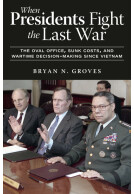Google Books previews are unavailable because you have chosen to turn off third party cookies for enhanced content. Visit our cookies page to review your cookie settings.
Zero-Sum Victory (Hardback)
What We're Getting Wrong About War
Imprint: University Press of Kentucky
Pages: 400
Illustrations: 15 charts
ISBN: 9780813152769
Published: 26th October 2021
Script Academic & Professional
Pages: 400
Illustrations: 15 charts
ISBN: 9780813152769
Published: 26th October 2021
Script Academic & Professional
You'll be £34.00 closer to your next £10.00 credit when you purchase Zero-Sum Victory. What's this?
+£4.99 UK Delivery or free UK delivery if order is over £40
(click here for international delivery rates)
Order within the next 10 hours, 46 minutes to get your order processed the next working day!
Need a currency converter? Check XE.com for live rates
(click here for international delivery rates)
Order within the next 10 hours, 46 minutes to get your order processed the next working day!
Need a currency converter? Check XE.com for live rates
Why have the major, post-9/11, US military interventions turned into quagmires? Despite huge power imbalances, major capacity-building efforts, and repeated tactical victories by what many observers call the world's best military, the wars in Afghanistan and Iraq turned bloody and intractable. The US government's fixation on zero-sum decisive victory is an important part of the explanation why successful military operations to overthrow two developing-world regimes failed to achieve favorable and durable outcomes.
In Zero-Sum Victory, Christopher D. Kolenda identifies three interrelated problems that have emerged from the government's insistence on a zero-sum victory. First, the US government has no organized way to consider successful outcomes alternative to decisive military victory and, thus, selects strategies that overestimate the prospects of such a victory. Second, the US is slow to recognize and modify or abandon losing strategies. In both cases, US officials believe their strategies are working even as the situations deteriorate. Third, once the US decides to withdraw, bargaining asymmetries and disconnects in strategy undermine the prospects for a successful transition or negotiated outcome.
By making powerful historic comparisons and drawing from personal experience, Kolenda draws thought-provoking and actionable conclusions about the utility of American military power in the contemporary world.
Other titles in University Press of Kentucky...















